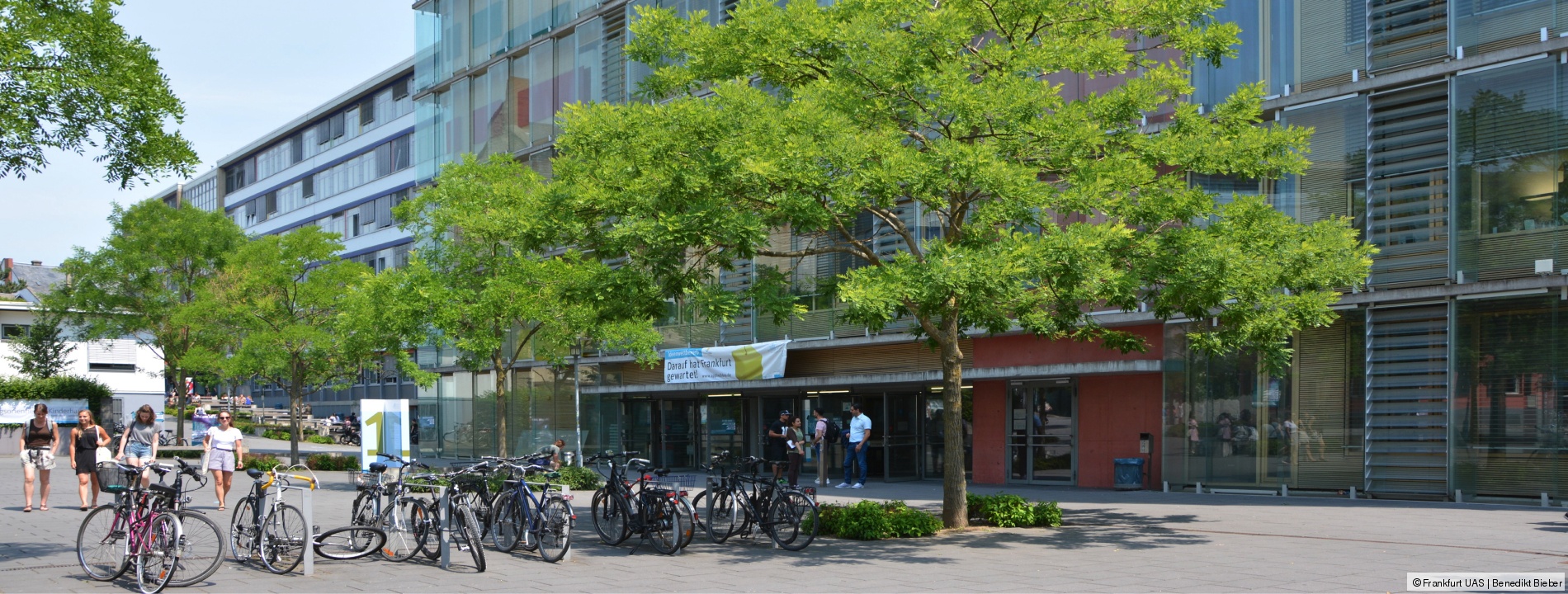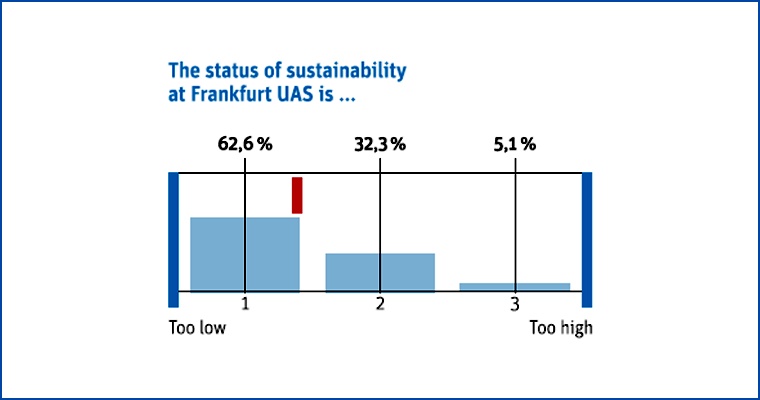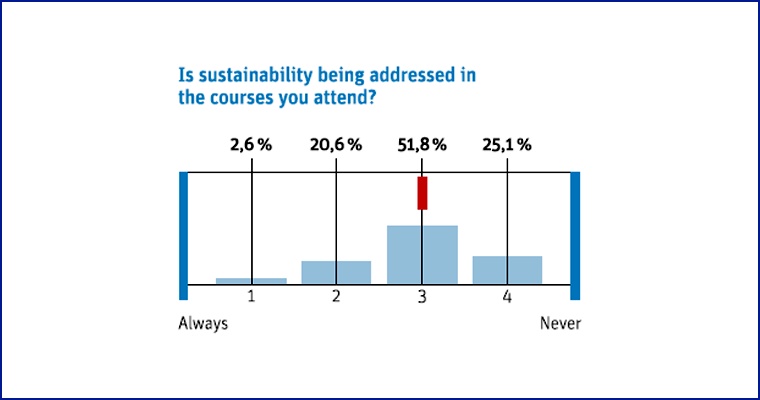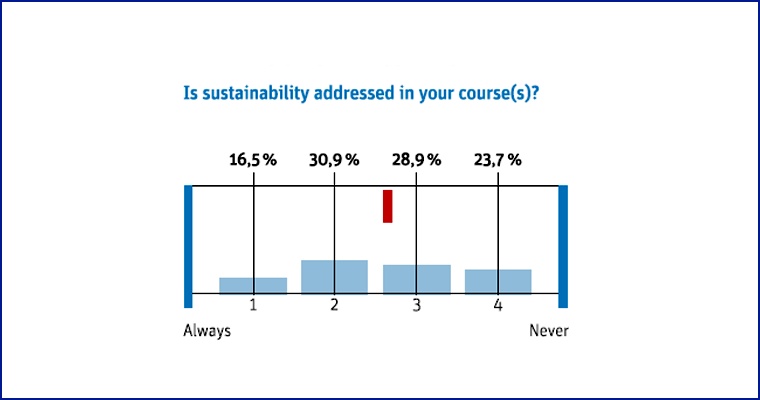Sustainable thinking and acting is no option but rather the order of the day, a responsibility that extends to everyone here at Frankfurt UAS. Anywhere, any time. Ignorance and carelessness often lead to actions with undesirable consequences. And they frustrate attempts to find better solutions. That is why we address the need for certainty and self-assurance by compiling the wide range of different activities available at this University within the context of sustainability. This truly impressive inventory provides guidance as to where our strengths lie and where we can still improve.
We are embarking on a new era. This has been conclusively demonstrated by the Corona crisis. Sustainability is the central theme. For society as a whole, and in particular for us as a University.
Achieving what we set out to do!
- We aim to become a carbon-neutral university by 2030.
- Professorships in sustainability are to be established in each faculty to strengthen research in this area, promote interdisciplinarity and contribute to advancing dialogue and exchange both with policymakers and with society as a whole.
- An office for sustainability is set up as a Green Office to systematically integrate sustainability into teaching, research, transfer and internal operations, in addition to bundling existing approaches and projects, in order to achieve greater dynamic capabilities for sustainability.
Each and every one of us – both as members of the University and individually – is called upon and has a responsibility to contribute towards greater sustainability for a better world. We are measured by how we ourselves live and work. With a view to the needs of our fellow human beings: environmental, economic and social.
There’s Still More that Can Be Done …
In order to ascertain the extent to which the principles of sustainability have already been integrated into teaching and learning, research, Continuing Education, transfer and University operations in accordance with the 17 Sustainable Development Goals of the United Nations – and also where University staff members see potential for development – surveys were conducted in the 2020/2021 winter semester in the areas of
- Studies and Teaching
- Research and Development
- Continuing Education and Transfer
- University Operations, incl. Mobility Patterns
An online survey was conducted over the period October 1-30, 2020, inviting 15,626 students (with a response rate of 2.0%), 468 administrative/technical staff (response rate: 22.4%) and 948 teaching staff (including 258 professors, 46 teachers for special responsibilities, 690 adjunct lecturers and 114 scientific staff members: response rate: 10.6%).
In addition, data recorded in the Research Information System (RIS) on publications, research and development projects was evaluated, as were the comparative carbon footprints of Hessen’s universities culled from the project report of the HIS Institute for Higher Education Development e.V. [HIS-Institut für Hochschulentwicklung e.V.] (2020).
Our report on the mobility patterns of University members is based on surveys conducted by the Research Lab for Urban Transport (ReLUT: survey sample periods 03/2017 and 03/2018).
As part of a survey conducted during the 2020/2021 winter semester on the development of a Sustainability Strategy, nearly 63% of University members belonging to all status groups responded that University’s sustainability status was too low, while 5.1% stated it was too high and 32.2% felt it was adequate. A total of 522 University staff members were surveyed, of whom the student body accounted for 60%; teaching staff, 19.3%; researchers, 7.9%; and administrative staff, 20.1% (multiple responses by teaching staff/researchers were possible).
Of those surveyed, 36.6% responded that they would be available as ambassadors of sustainability; 13.3% responded similarly, provided that the time commitment be within reasonable limits and/or commensurate with studies/professional activities. Remuneration is proposed for students; course releases and/or reduced workload is proposed for tenured/civil servant University staff.
A resource-efficient method of managing working time is planned as a prerequisite for the collaborative process, safeguarded by means of good preparation, specific tasks/projects. An additional prerequisite for the collaborative process is shared fundamental values. In this way, concrete measures are to be implemented in practice – and not just in words. The acceleration of University processes is crucial in this connection.
Teaching and Studying Sustainability
A total of 313 students took part in our online survey:
- 16.9% from Faculty 1:
Architecture · Civil Engineering · Geomatics (*18.6%) - 22% from Faculty 2:
Computer Science and Engineering (*38.1%) - 12.2 % from Faculty 3:
Business and Law (*21.5%) - 33.9% from Faculty 4:
Social Work & Health (*21.9%) - 5 % in an interdisciplinary study program.
(*participation rate of students in 2019. Source: QEP and StuPort departments)
On the teaching staff side (professional staff, teachers for special responsibilities, adjunct lecturers and scientific staff), 101 persons participated in the survey; the largest group being from Faculty 2, at 39.6% (*22.5%); and Faculty 4 having the lowest participation rate, at 15.8% (*35.2%). The participation rate among respondents from Faculty 1 was 17.8% (*18.3%), compared to 22.8% (*24 %) from Faculty 3. (*participation rate of teaching staff in the faculties, source: QEP Dept., survey date: 12/31/2019).
When asked if – on a scale of 1 (“always”) to 4 (“never”) – the topic of sustainability was addressed in courses attended, 51.8% of students responded with a rating of 3; 25.1%, with “never”; and 20.6%, with a rating of 2. A total of 2.6% responded that the topic of sustainability formed an integral part of their course at all times.
By comparison, the fluctuation of the teaching staff’s response rates was less substantial, with the most frequent rating being 2, at 30.9%, followed by a rating of 3, at 28.9%, and the least frequent rating of 4 (“never”), at 23.7%. A total of 16.5% of teaching staff responded that sustainability was always addressed in their courses.
Sustainability certificates
To the survey question of whether it was currently possible for a sustainability certificate to be acquired, 99% of the teaching staff responded in the negative. This is offered only in the Master’s degree program Sustainable Structures with the exam for a “Young Professional of the DGNB.”
Specialist knowledge
Faculty 1: Architecture · Civil Engineering · Geomatics: environmentally friendly and/or sustainable materials, critical management of concrete, building materials and their energy consumption/life cycle, sustainable construction, environmentally sound construction processes, renovation, restoration, rehabilitation, upcycling, sites and locations, design, recycling in demolition vs. recyclable raw materials in new building and practical applications of theory.
Faculty 2: Computer Science and Engineering: effective use of (collected) data for process optimization, green IT, resource-efficient programming, EE, energy revolution, power generation, efficient production, e-waste disposal, etc., recycling, sustainable materials for vehicle construction, where and how are materials sustainably sourced?, what chemicals have what kind of impact on environment/nature?, social responsibility of engineers.
Faculty 3: Business and Law: sustainability in economic and corporate activities, sustainable corporate governance/management, sustainable investment, sustainable economics, social entrepreneurship “short-term returns/long-term costs due to clear-cutting/carbon emissions,” sustainable resource use, sustainable controlling, business law (also at EU level), linkage of computer science with business through sustainability.
Faculty 4: Social Work & Health: sustainable business ideas, sustainability in Social Work, sustainability in working life, sustainability in social institutions, education for children and adolescents towards sustainable development, effects of sustainable housing and sustainable nutrition on clients’ quality of life, diseases of civilization, waste avoidance in clinical contexts, resource-efficient use of teaching materials, long-term and short-term impact evaluation, evaluating meaningfulness of interventions/impacts of measures in terms of environmental and economic consequences, B.A.: economy and implications for the climate crisis, methods of feasible sustainability concepts, environmental management, exploitation of people in developing countries/major corporations that disregard environmental standards in developing countries, major corporations that disregard human rights, healthful nutrition and lobbying, financial viability of sustainability also for welfare recipients, is sustainability a question of affordability and/or what other possibilities for taking action are there?, social justice, ethical and political sustainability, resource justice.
Teaching forms
Of the teaching staff surveyed, 22.7% indicated that they were aware of didactic teaching forms they considered particularly suitable for exploring the topic of sustainability, whereas 77.3% responded in the negative.
The general question put to teaching staff was whether teaching forms suitable for exploring the topic of sustainability differed from those typically employed at a UAS.
Once awareness of sustainability is raised, respondents felt it was important to become familiar with, and learn to differentiate, the various definitions of the topic. Respondents also noted that environmentally, socially and economically balanced developments for the preservation of a viable and sustainable future should be outlined. Intergenerational and global justice, as well as an understanding of general principles, round out the curriculum. The interdisciplinary approach in the transfer and development of curricula was regarded as essential.
For the further development of didactics in teaching sustainability, reference was made to, inter alia, “Didactic principles for education for sustainable development in teacher education, ESD Consortium CO-HEP, 2013 [Didaktische Grundlagen zur Bildung für Nachhaltige Entwicklung in der Lehrerinnen- und Lehrerbildung, BNE-Konsortium COHEP, 2013].” In general, a variety of teaching methods are encouraged in our courses; ranging in detail from scientific analyses and general principles through to “thinking in processes with explicit criteria for success.” In this context, the particular focus is on clarity and descriptiveness to bridge theoretical knowledge with the practical implementation of sustainability topics. Respondents noted that the relevance of a critical examination of sustainability for professional and personal future goals should be demonstrated using personalized reports, case studies and/or specific examples (projects, simulation games and the like).
In addition, by integrating sociopolitical developments into personal lifestyles (including consumer habits, personal life design), it is possible not only to render visible the full impact of our own actions but also to foster and discuss an understanding of personal responsibility.
Digital teaching
As a consequence of the Corona pandemic, the 2020 summer semester took place predominantly online under extraordinary circumstances. Based on this experience, the following advantages and disadvantages were called out with regard to sustainability: respondents noted that they were able to conserve personal resources such as health and time thanks to digital courses and to manage their time more flexibly.
In addition to reducing commuting-related CO₂ emissions, working from home and online courses helped to cut down on traffic congestion and mobility costs. Speed of information gathering was perceived as positive.
With respect to the courses themselves, positive reference was made to the fact that intensive digital media involvement had improved digital working and its management. Conserving courses meant that they could be taught multiple times by teaching staff and offered to students.
By contrast, private financial resources were strained as a result of increased energy and paper consumption or also upgrading the technical infrastructure and emissions in private consumption such as waste and CO₂ emissions.
Based on the feedback received, teaching quality suffered from a lack of – most particularly – nonverbal communication, social networking and interaction. But also limited technical support made the transition to digitization difficult. Respondents noted that they were more easily distracted than during in-classroom teaching. They also indicated that teaching methods based on haptics and immersive experience were possible only with some difficulty. The connection to the University as a place of teaching and learning was also lacking and generally missed.
Teaching modules
In order to allocate teaching modules to the topic of sustainability using a) “mostly” or b) “taught marginally” as differentiation criterion, the faculties listed and classified the corresponding teaching modules in the 2020/2021 winter semester, assigning key terms as appropriate:




